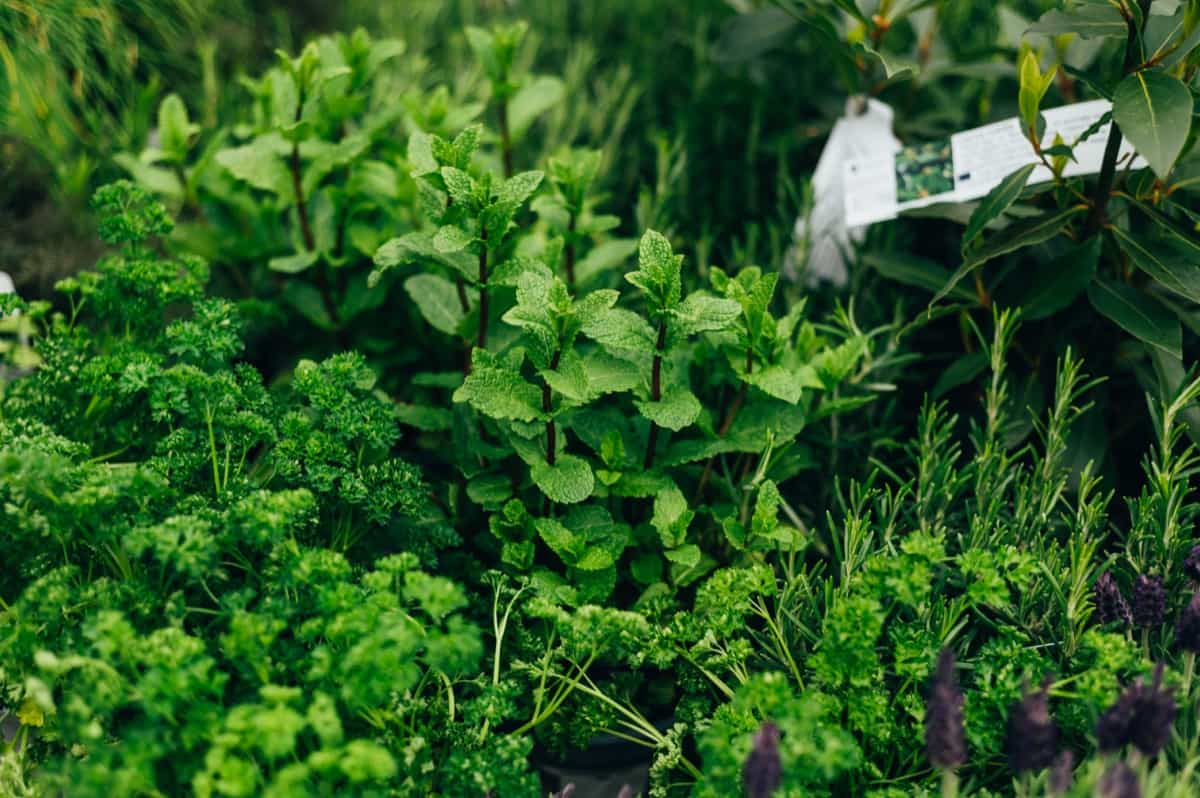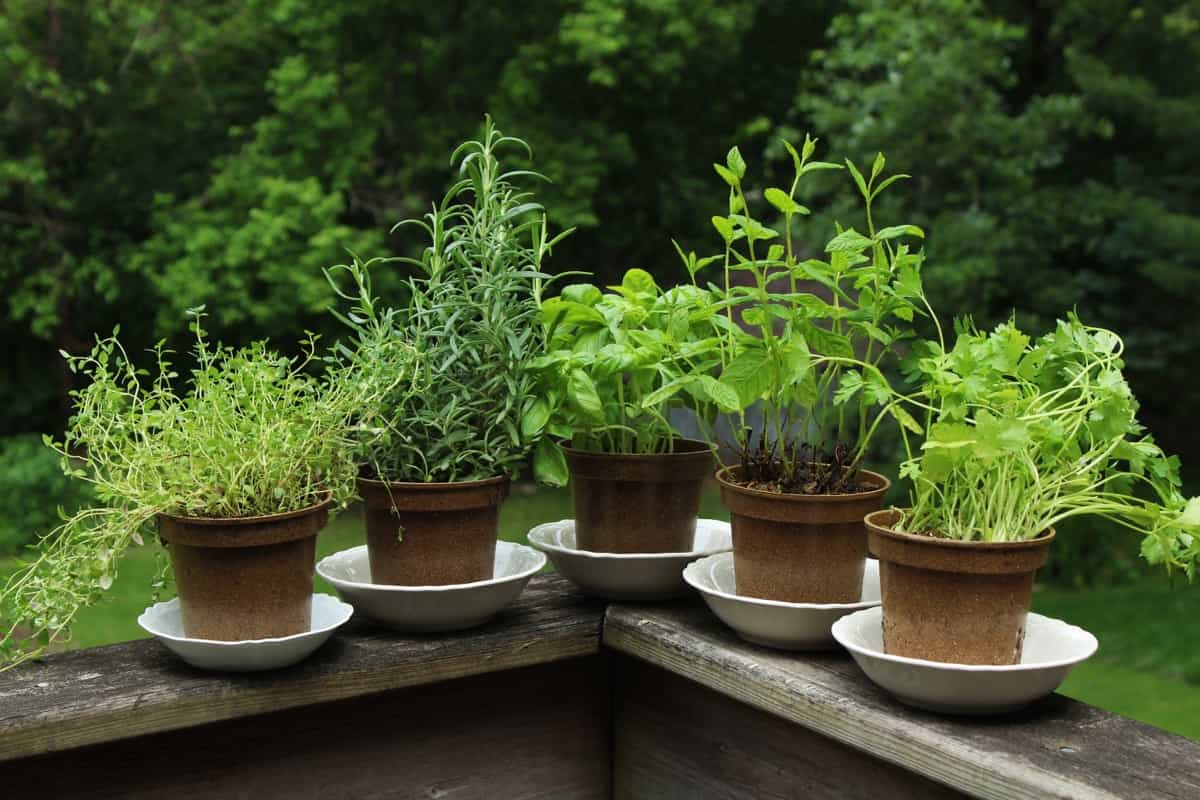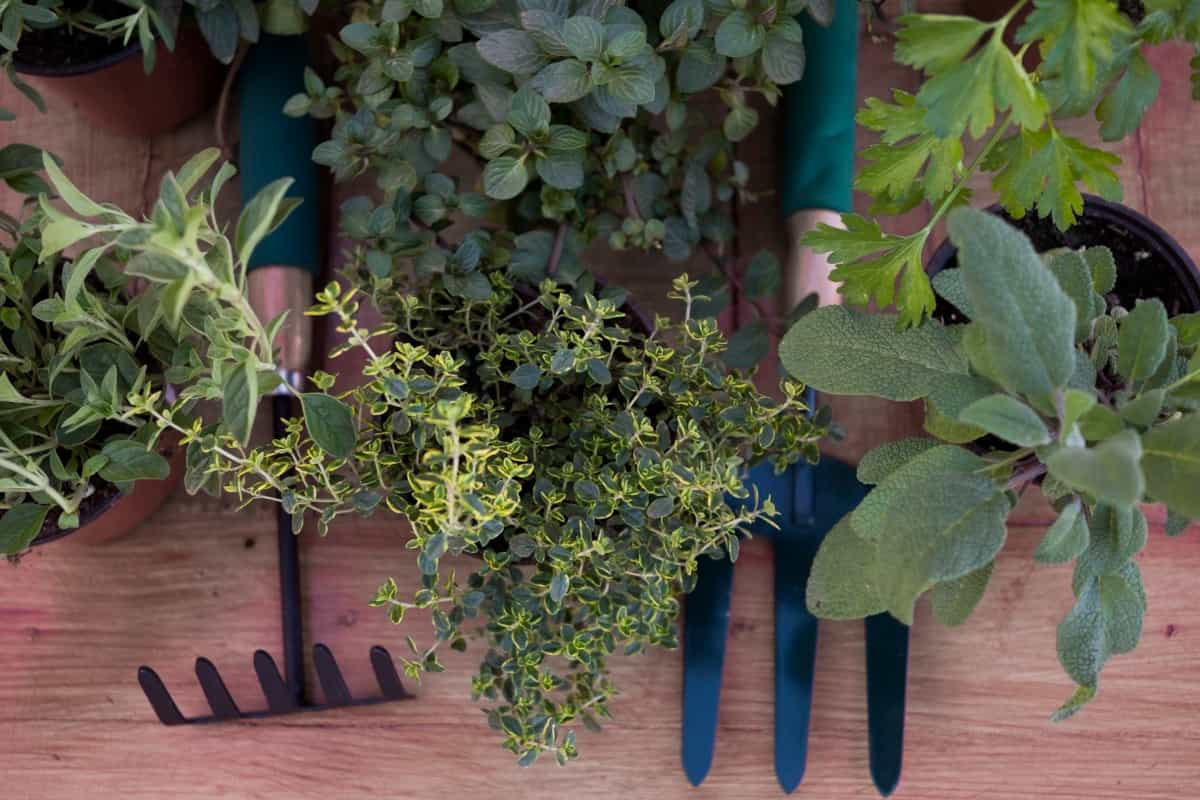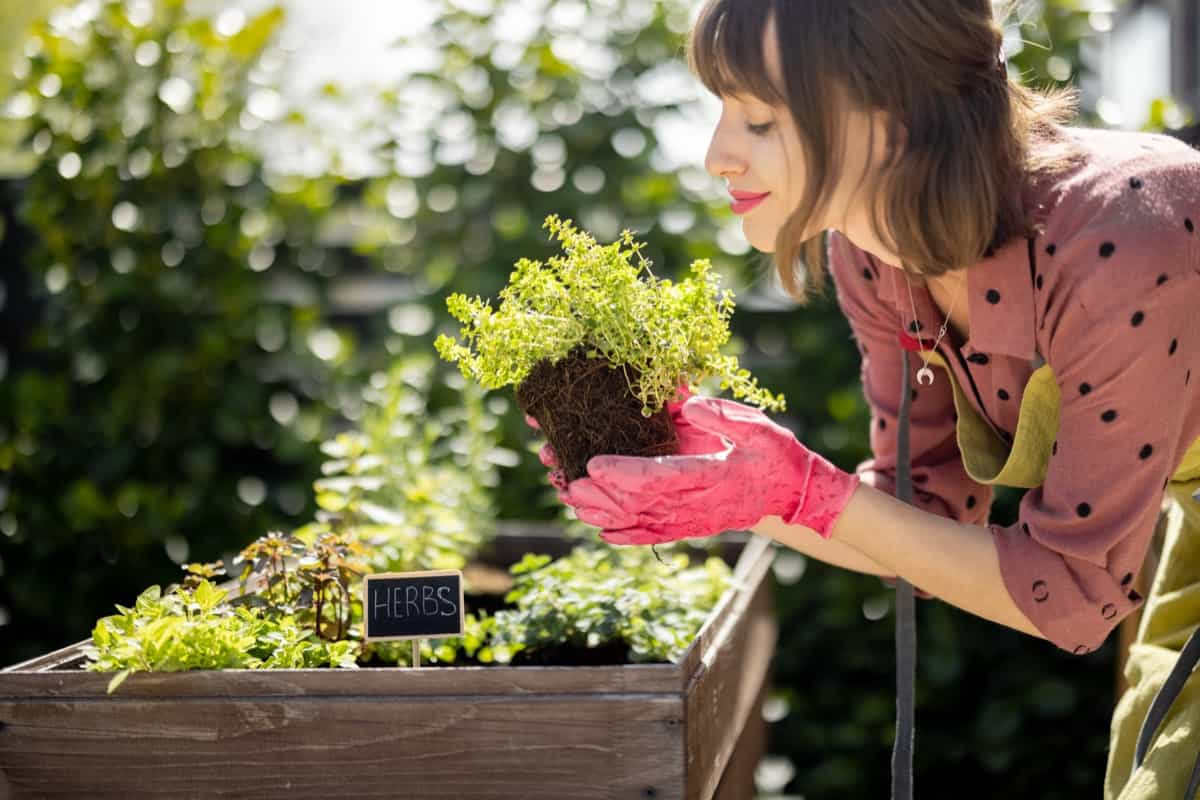Herb gardening is a rewarding and enjoyable activity allowing individuals to cultivate fresh and flavorful herbs. Whether you are a seasoned gardener or a beginner, it is common to encounter certain challenges. This article will explore ten common problems with herb gardening that gardeners often face and provide effective treatments and solutions to overcome them.

10 Common Problems With Herb Gardening
Preventing Herb Plants From Bolting in the Garden
- Choose the right varieties: Some herb plants are more prone to bolting than others. When selecting herbs for your garden, opt for varieties that are slow to bolt. Examples include flat-leaf parsley, French tarragon, chives, and cilantro.
- Plant at the right time: Timing is crucial for preventing bolting. Sow your herb seeds or transplant seedlings at the appropriate time for each herb. Generally, cool-season herbs like cilantro and parsley should be planted in early spring or fall, while warm-season herbs like basil and rosemary do best when planted after the last frost.
- Avoid overwatering, as it can lead to shallow root development and increase the risk of bolting.
- Most herbs thrive in full sun, but excessive heat can trigger bolting. Ensure your herb plants receive at least 6-8 hours of sunlight daily.
- Harvest frequently: Regular harvesting of herb leaves can help delay bolting. Removing mature leaves regularly prevents the plant from reaching its reproductive stage.
Dealing With Pests on Herb Plants in the Garden
Little green bugs on pests, commonly known as aphids, can wreak havoc on herb plants if left unchecked. They are small, soft-bodied insects that feed on the sap of plants, causing damage to the leaves and stems. One effective approach is to these pests on herbs and, controlling, introduce natural predators into your garden. Ladybugs, lacewings, and parasitic wasps are beneficial insects that feed on aphids.
And also, to keep bugs off herbs naturally, use peppermint, lavender, or neem oil spray. These are useful in herb garden pest control. Put the mixture in a spray bottle and apply it to your herbs to help eliminate fleas, flies, and gnats. This essential oils spray is also good for killing moths and spiders on your herbs. Neem oil is also great for killing and repelling pests in your garden. For controlling bugs on herbs indoors, you can also use garlic Spray.
Common Causes of Yellowing Leaves in Herb Plants
- One of the most common reasons for yellowing leaves in herb plants is overwatering. If that is the cause, reduce the frequency of watering.
- Underwatering can also cause yellowing leaves in herb plants. Water your outdoor herbs regularly, especially during hot and dry periods.
- Yellowing leaves can indicate nutrient deficiencies, such as nitrogen, iron, or magnesium. To overcome this, use a balanced 10-10-10 fertilizer recommended for herbs
- Excessive heat, cold temperatures, lack of sunlight, or exposure to harsh winds can also be the reason why are my outdoor herbs turning yellow. Ensure that your herbs are planted in suitable locations.
In case you missed it: Plant Spacing Chart for Vegetables, Fruits, Flowers, and Herbs

Solutions for Preventing Fungal Diseases in Herb Gardens
Proper Plant Spacing: One of the key steps for the prevention and control of fungal diseases is to ensure adequate spacing between plants. This allows for proper air circulation, reducing the chances of fungal spores settling on the leaves.
Watering Techniques: To control fungal diseases, opt for a drip irrigation system or water the plants at the base, avoiding wetting the foliage. Watering in the morning allows the leaves to dry out during the day, minimizing the risk of fungal growth.
Natura fungicides: Some options include neem oil, garlic oil, or a baking soda solution. These natural remedies can help suppress fungal growth without harming beneficial insects or pollinators.
Identifying and Treating Nutrient Deficiencies in Herb Plants
| Nutrient Deficiency | Identifying symptoms | Treating with fertilizers |
| Nitrogen | Pale or yellow leaves, stunted growth | compost or manure. |
| Phosphorous | slow growth, purpling of leaves | bone meal, worm castings |
| Potassium | weak stems, brown leaf margins, and reduced yields | Wood ash, greensand |
Protecting Herb Plants From Excessive Heat or Sunburn
- Provide shade to herb plants during the hottest part of the day.
- Use a shade cloth or place the plants under a tree or tall structure.
- Water the herb plants deeply to keep the soil cool and moist.
- Mulch around the plants to hold moisture and regulate soil temperature.
- Use reflective mulch or aluminum foil to direct sunlight away from the plants.
- Consider using a portable shade structure or umbrella for potted herb plants.
Preventing Overwatering in Herb Gardens
- Watering Herbs Outdoors: Most herbs are watered about once weekly. Sometimes twice a week will be needed during extreme heat or drought conditions. Water in the cooler hours of the morning, between 6 to 10 am, to avoid evaporation and allow for deep root soaking.
- Watering Herbs in Indoors: When watering indoor herbs, it’s essential to water them gently and evenly. Avoid drenching the soil or creating water puddles. Instead, use a watering can to provide a controlled amount of water. How often do you water herbs indoors? Herbs grown indoors generally need to be watered when the top inch of soil is dry.
- WateriNg Herbs in Pots: How often do you water herbs in pots? You should water your herbs twice to thrice a week. Herbs that require more watering: Basil, cilantro, mint, and parsley. After planting or buying your herbs, provide enough water to moisten the soil for a few days.
In case you missed it: How to Setup a Balcony Herb Garden from Scratch: A Step-By-Step Guide

How to Deter Herb-loving Animals From Eating Herb Plants
- Garlic and Chili Powder: As the best animal repellent for gardens, Sprinkle a mixture of garlic and chili powder around your herb garden. The strong smell and taste will deter animals from coming near.
- Marigolds: As one of the natural ways to repel animals from the garden, plant marigolds near your herb garden can repel rabbits and deer with their strong scent.
- Rosemary: The strong aroma of rosemary can deter herb-loving animals from approaching. Plant rosemary near your herb plants to provide an added layer of protection.
Dealing With Herb Plants That Are Prone to Legginess
- If your plants are not receiving enough light, consider moving them to a sunnier location or using artificial grow lights to supplement natural light.
- Make sure to space your herbs appropriately to allow for good air circulation and prevent competition for light and nutrients.
- Pruning is an essential practice to prevent legginess in herb plants. Pinching the tips of the stems will encourage branching and result in bushier growth.
- In some cases, if the leggy growth is severe or the plants struggle to recover, it may be best to start with new herb plants.
Treating Herb Plants for Leaf Spot or Blight Diseases
- Consider planting disease-resistant herb varieties. Remove and discard any infected leaves or stems.
- Apply a fungicide specifically labeled for herb plants. Follow the dosage recommendations on the fungicide label for proper application.
- Ensure good air circulation around the plants. Rotate the location of herb plants each year to minimize disease buildup.
- Closely monitor the plants for signs of re-infection. If necessary, repeat the fungicide application as directed.
In case you missed it: Pot/Container Gardening with Herbs: A Guide to Growing Fresh Flavors at Home

Conclusion
You can ensure a thriving and productive herb garden by addressing these common problems with herb gardening and implementing the suggested treatments and solutions. Remember to monitor your plants regularly, provide appropriate care, and seek additional guidance when needed.
- Ultimate Guide to Ossabaw Island Hog: Breeding, Raising, Diet, and Care
- Ultimate Guide to Juliana Pig: Raising Facts, Size, Diet, Care, and Lifespan
- Raising Lleyn Sheep: Disadvantages, Price, Uses, Characteristics, and Care
- Ultimate Guide to Meishan Pig: Breed Facts, Breeding, Raising, and Care
- Ultimate Guide to Teacup Pigs: Raising, Diet, Lifespan, Cost, and Care
- Guide to Raising Poll Dorset Sheep: Facts, Profile, Characteristics, Uses, and Care
- Ultimate Guide to Bighorn Sheep: Characteristics, Diet, Lifespan, Breeding, and Lifecycle
- Ultimate Guide to Raising Katahdin Sheep: Farming Facts, Breed Profile, Uses, and Care
- Ultimate Guide to Raising Oreo Cows: Belted Galloways Farming Facts, Profile, Uses, and Care